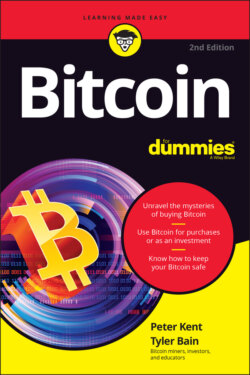Читать книгу Bitcoin For Dummies - Peter Kent - Страница 43
The Bitcoin blockchain is “immutable”
ОглавлениеRemember when we said earlier that the Bitcoin blockchain is immutable that once created, it can’t be changed? It’s the hashes that make it immutable. If the Bitcoin blockchain says you own x Bitcoin, then you do own x Bitcoin, and there can be no disagreement…and nobody can go into the blockchain and hack it or somehow change or alter it.
Imagine what would happen if someone went into a block (we’ll call it Block A) and changed a little bit of data — for example, they went in and showed that instead of sending someone one Bitcoin, you sent nine.
Well, the hash in Block A would no longer match its data. Remember, a hash is a fingerprint that identifies the data, so if you change the data, the hash no longer matches.
Okay, so the hacker could rehash Block A’s data and then save the “corrected” hash. But wait, now the next block (Block B) would not match because Block B is carrying Block A’s original hash, and they just changed that. So now, the hacker needs to change the Block A hash stored in Block B.
But now Block B’s hash doesn’t match Block B’s data, because that hash was created from a combination of Block B’s transaction data and Block A’s hash!
So, Block B would have to be re-hashed, and the hash updated. But wait! That means Block B’s hash stored in Block C now doesn’t match!…
See where we’re going? This would ripple through the entire blockchain. The entire blockchain would now be broken above the “hacked” block, by modifying just one single character in that block. In order to fix the problem, the entire blockchain would have to be recalculated. From the hacked block onwards, it would need to be “re-mined,” as they say in the Bitcoin world. What may look like a simple hack and database edit has now turned into a major computational headache that cannot be easily completed.
So, this hashing function, combined with the fact that thousands of other nodes must be in sync with identical copies of the blockchain, makes the blockchain virtually immutable; it simply can’t be hacked.
Nobody can change it or destroy it. Hackers can’t get into the peer-to-peer node network and create transactions in order to steal crypto, governments can’t close it down (China, for example, could attempt to shut down Bitcoin within its borders, as they have tried recently, but the blockchain would continue to exist in many other countries, and even in China for people managing to get through the Chinese “Great Firewall”), a terrorist group can’t destroy it, one nation can’t attack another and destroy its blockchain, and so on. Because so many copies of the Bitcoin blockchain prevail in so many countries, and as long as enough people want to continue working with the blockchain, it’s practically immutable and indestructible.
